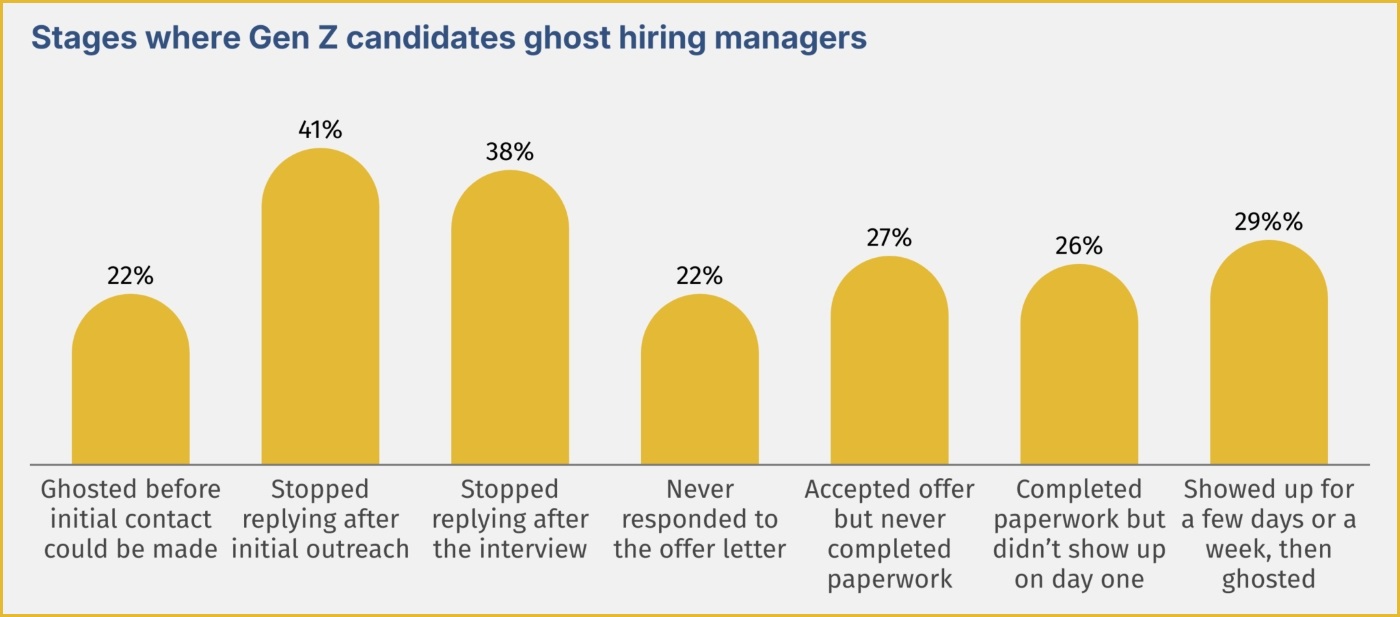Youthful job seekers are getting a popularity for ghosting workplaces even after they’ve landed a job, main some employers to miss Gen Z candidates completely, a brand new report has discovered.
Earlier analysis has discovered Australian job hunters are more and more being ghosted by recruiters and corporations through the utility course of.
However a survey performed by Resume.org discovered this goes each methods, with HR managers reporting youthful individuals particularly are often disappearing through the interview course of, after being supplied a job, and even after working a couple of days.
The survey of 1,115 hiring managers in the US discovered greater than half had been ghosted by a Gen Z candidate after extending a job supply to them, and practically one in 10 stated they not thought of hiring Gen Z staff due to this.
Round 90% of these surveyed stated Gen Zers — these born roughly between 1997 and 2012 — had been extra prone to ghost than different age teams.
Who’s responsible?
The rise in ghosting by candidates could also be as a result of how simple it’s to use for a job now, based on Stephen Langhammer, a director at Australian recruitment agency Robert Half.
“Making use of for jobs takes minimal effort, typically only a few clicks, that means Gen Z candidates might apply considerably indiscriminately, with out thorough firm analysis or a full understanding of the place,” Langhammer stated.
Fellow Robert Half director Tom Ward stated he had seen some Australian Gen Z candidates ghost an employer, principally in IT help and junior to mid-level growth.
He stated organisations wanted to hurry up the hiring course of to be able to keep away from this taking place.
“High quality tech candidates are nonetheless extremely in demand and may safe roles rapidly,” Ward stated.
“If the turnaround time between submitting an utility and receiving a name is simply too lengthy, the candidate might have secured a job elsewhere and never reply.
“It’s frequent for job ads to stay lively for 2 to a few weeks earlier than functions are even initially assessed, which is simply too lengthy.
“Equally, the period between interview phases additionally must be condensed.
“Prolonger recruitment processes inherently improve the danger of shedding fascinating candidates, both to competing affords or diminishing curiosity.”
Dangerous popularity dangers ‘long-term expertise gaps’
The Resume.org survey discovered greater than 1 / 4 of those that had been ghosted by a Gen Zer skilled it after the candidate had accepted the supply however earlier than that they had accomplished the mandatory paperwork.
In the meantime, 26% stated it occurred after the contract was signed however earlier than the worker confirmed up for his or her first day.
Almost 30% stated a candidate had proven up for a couple of days or perhaps weeks after which disappeared with no phrase.
Most of the younger ghosters did so after the preliminary outreach or after an interview, the survey discovered.
This had a major affect on workplaces and on the popularity of younger job candidates, the report stated.
Two-thirds of these surveyed stated a candidate who ghosted them had made the hiring course of harder.

Picture: Resume.org / Provided
Almost half of the hiring managers stated the expertise of being ghosted had decreased their belief in youthful candidates, and greater than a 3rd stated they had been now extra in favour of older candidates.
“Giving up on Gen Z candidates is a dangerous transfer; they’re the way forward for the workforce,” stated Resume.org’s head of profession advising, Kara Dennison.
“Writing off a complete era not solely shrinks the expertise pool, however it dangers age bias and long-term expertise gaps.”
To keep away from these conditions, organisations wanted to rethink the hiring course of, Dennison stated.
“To scale back ghosting, corporations have to reevaluate outdated processes, equivalent to slope timelines, poor communication, or unclear expectations,” she stated.
“Gen Z is extra prone to commit after they expertise authenticity, velocity, and mutual respect.
“As an alternative of resisting change, organisations ought to adapt and use this chance to construct lasting loyalty.”

